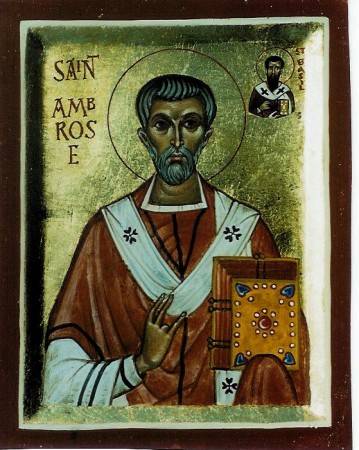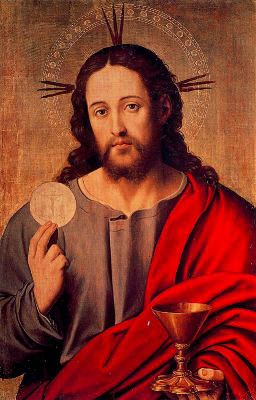In the Sherlock Holmes story “Silver Blaze,” involving the disappearance of a thoroughbred racehorse, Holmes points out a major clue:
Gregory (Scotland Yard detective): “Is there any other point to which you would wish to draw my attention?”
Holmes: “To the curious incident of the dog in the night-time.”
Gregory: “The dog did nothing in the night-time.”
Holmes: “That was the curious incident.”
Had it been a stranger, the dog would have sensed alarm, and barked. Thus, Sherlock Holmes is able to deduce that the horse-thief is someone that the dog knows well. In reading the Church Fathers, there are at least two areas where we find dogs that didn’t bark.
I. The First Dog that Didn’t Bark: Non-Catholic Eucharistic Theology
I noticed the first of these two non-barking dogs while listening to Johann Friedrich Fasch’s
Passio Jesu Christi. It’s transcendentally beautiful (especially track 25,
Meine Laster sind die Stricke), and I’ve been listening to repeatedly for the last few weeks. But Fasch was a Lutheran, from a family of Lutheran theologians, and his account of the Last Supper reflects Lutheran Eucharistic theology. After the consecration, one of the singers (representing the daughters of Zion) proclaims:
 God, for whom the infinite heavens,
God, for whom the infinite heavens,
and all space as space is too small,
is present here, in an unfathomable way,
with, and as bread and wine.
He would be the spiritual food of sinners,
oh love, oh grace, oh wonder.
Catholics can’t affirm this without denying the Real Presence. Christ doesn’t come to us with bread and wine in the Eucharist. The bread and wine become His Body and Blood. He’s not just present: they become Him. It’s possible that Fasch wrote this to get a potshot in at Catholics, but I doubt it. I think instead that he was expressing, as a devout Lutheran, his understanding of the Last Supper. Had Fasch been a Calvinist, he’d have described the Eucharist in Calvinistic terms.
But this got me thinking about the early Church Fathers. If the early Church Fathers had non-Catholic Eucharistic theology, why do we never see them affirm something Catholics deny? That is, why do we never see them say things like Christ is “with, and as bread and wine”? Where do we see them saying that the bread and wine remain bread and wine after the consecration?
It’s not as if the Church Fathers were quiet on the Eucharist. I’ve compiled a list of some select quotations from
the first and second century,
third century, and
fourth century. Entire books have been written on this subject. Yet everything I’ve read from every Church Father is compatible with Catholic Eucharistic theology, and in many cases, compatible
only with Catholic Eucharistic theology.
For example, St. Ignatius of Antioch, a student of the Apostle John,
wrote sometime between 103-110 A.D. to stay away from the Gnostics, since they “
abstain from the Eucharist and from prayer, because they confess not the Eucharist to be the Flesh of our Saviour Jesus Christ, which suffered for our sins, and which the Father, of His goodness, raised up again.” But of course, most Protestants likewise “confess not” the Eucharist to be the Flesh of our Savior, taking It to be a mere symbol, instead. So we hear the Patristic dog barking, warning us that the symbolic (or merely spiritual) view of the Eucharist was
not the view known to the students of the Apostles.

Likewise, as discussed
here, Lutherans have historically denied that the Eucharist could be taken to the sick, believing that the Real Presence of Jesus only exists during the Liturgy. Yet there’s no question from Justin Martyr’s
First Apology (written between 150-155 A.D.), that after the consecration, “
to those who are absent a portion is sent by the deacons.” There’s that Patristic dog barking again, warning us that the Lutheran view of the Eucharist was not the view of the Church of 150 A.D.
Yet when it comes to Catholics, the Patristic dog never barks. That’s not to say that you can’t cherry-pick some Patristic quotations, of course. As Catholics, we believe both that (a) the Eucharist is the Body and Blood of the Lord, and (b) that the Eucharist is full of Christological symbolism (Christ chose bread and wine for a reason, after all). So you can find plenty of Fathers talking about (b). This doesn’t contradict Catholic Eucharistic theology, and you’ll find plenty of Fathers who talk about both (a) and (b).
But what you can’t find — or at least, what I haven’t found — are any Fathers who say something that Catholics deny. There aren’t any Fathers saying the sort of things that Fasch’s Daughters of Zion say, for example: no one affirming that Christ is “with, and as bread and wine.” That lack of evidence is telling.
II. The Second Dog that Didn’t Bark: Outcry at Catholic Eucharistic Theology
As I mentioned above, there are plenty of Patristic citations that are incredibly Catholic. St. Cyril of Jerusalem
writes back in about 350 A.D., “
You have been taught and you are firmly convinced that what looks and tastes like bread and wine is not bread and wine but the Body and the Blood of Christ.” That’s almost everything that Catholicism teaches about the Eucharist, summed up in a single sentence. And nearly all Protestants would deny that statement as false, even idolatrous.
Likewise, St. Ambrose (St. Augustine’s mentor) writes in the late 380s that the Eucharist “is the true Flesh of Christ which crucified and buried, this is then truly the Sacrament of His Body.” These aren’t isolated claims: there are countless Fathers you can point to making these (and other similarly clear) statements about the Eucharist. And in every case, the vast majority of Protestants would deny these statements as heretically, even diabolically, wrong.
So assume that the early Church agreed with what these Protestants now claim. When people like Cyril and Ambrose start making these claims, what should we expect?
The answer is obvious. We should expect to see a lot of outrage on this point. The pure Gospel is being diluted with pagan nonsense, right? We should see epistles and tracts written decrying this paganism, we should see Councils condemning this as idolatrous nonsense, and if the early Church is really Protestant, we should see some schisms. After all, what would happen if, instead of Ambrose and Cyril, it was Billy Graham, John MacArthur or John Piper proclaiming this from the pulpit?
As I’m sure you’ve guessed by now, that’s the second dog that doesn’t bark. When Cyril and Ambrose refer to the Eucharist in unambiguously Catholic terms, no one objects. There’s no outrage, not even a hint of disagreement. Not a bark, not even a whimper.
But maybe there’s something wrong with the dog, right? Maybe the Fathers just weren’t the barking type, and would look over the rank heresy their peers were preaching because everybody means well? Here’s just the beginning of St. Jerome’s
Apology Against Rufinus (c. 402 A.D.):
I have learned not only from your letter but from those of many others that cavils are raised against me in the school of Tyrannus, by the tongue of my dogs from the enemies by himself because I have translated the books Περὶ ᾿Αρχῶν into Latin. What unprecedented shamelessness is this! They accuse the physician for detecting the poison: and this in order to protect their vendor of drugs, not in obtaining the reward of innocence but in his partnership with the criminal; as if the number of the offenders diminished the crime, or as if the accusation depended on our personal feelings not on the facts. Pamphlets are written against me; they are forced on every one’s attention; and yet they are not openly published, so that the hearts of the simple are disturbed, and no opportunity is given me of answering. This is a new way of injuring a man, to make accusations which you are afraid of sending abroad, to write what you are obliged to hide.
If you couldn’t figure it out from the quotation, Jerome was being denounced by Tyrannus Rufinus and others simply for having translated some of Origen’s works into Latin (something that Rufinus would later do himself).
There was a wild outrage over this, with pamphlets published and nasty personal attacks both against Jerome, and later, by Jerome against his accusers. My point is this: the fourth century Church was ready to go into conniptions about whether or not to translate Origen’s works into Latin, and then whether Jerome or Rufinus had done it more accurately. And we’re to think that this same Church knew that idolatry and heresy was being taught, but just couldn’t get themselves worked up over it?
But I anticipate a second objection: maybe it’s because this is the fourth century, and Roman Catholicism has already choked out the true Gospel. Well, then, find the origin of the Catholic “heresy” of the Real Presence, and show me where the Christians living at that time were outraged, as modern Protestant would be. The simple fact is, we don’t see this outrage in the fourth century, or the third, or the second, or the first. The dog never barked.
Conclusion
The Catholic position on history is that She represents the full and complete Gospel, as handed down by the Church Fathers. Her views on the Eucharist today (and justification, Mary, the papacy and the structure of the Church, indulgences, etc., etc., etc.) are all consistent with the views of the Church at any point in history, going back to the time of the Apostles, and thus, back to Christ.
Protestantism denies this, claiming that the Church believed what modern Protestants believed first, but that Catholic errors crept in over time. The Eucharist is a single, albeit critically important, example here. My point in this post is two-fold: (1) we don’t see any clear instances of the early Church proclaiming anything inconsistent with the Catholic view on the Eucharist, and (2) we don’t see any objections when the Catholic view is explicitly proclaimed.
Certainly, we find both of those things easily in post-Reformation Protestantism: one need not look hard to find distinctively Protestant Eucharistic theology, and denunciations of the Catholic view. If Protestantism were true, we’d expect to see both of those things in the early Church, as well. As it is, we should take a clue from Sherlock Holmes: the reason the Patristic dog didn’t bark is that she recognized the Catholic Church as her owner, not a stranger coming in the night.
God, for whom the infinite heavens,





Diaz,
(1) How does Matthew 4:4 show that “every word that comes from the Mouth of the Father” is limited to written Scripture?
(2) So is it your interpretation that anyone who doesn’t have the proper canon of Scripture isn’t elect?
1. Yes.
2.Yes: The elect of God will recognize His voice, or else Christ’s Word is false.
-h.
Diaz,
I asked “How” in (1).
Joe
Let me add an important qualification to 2.
One may possess a copy of the Scriptures that has corrupted books in it, e.g. a Bible containing the Apocrypha, and not believe those books, see and understand them to be teaching error, but never vouch to remove them from the Scriptures for other reasons.
This is a difference, in other words, between possessing the correct canon and believing it.
-h.
hahaha sorry. I just woke up :/
Deuteronomy is itself referring to the written Word of God (cf. Josh 1:8). What God spoke to Israel was to be written down.
Moreover, what is written is what has been revealed by God for their rule of faith and practice. Contextually, then, Christ is utilizing the Scriptures in obedience to command of the Scriptures to live by the Scriptures alone.
Also, in the context of Deuteronomy, God says that what He wants His people to live by is that which has been revealed, and that which has been revealed is all that is contained in the book (cf. Deut 29:29).
-h.
Diaz,
You say:
Contextually, then, Christ is utilizing the Scriptures in obedience to command of the Scriptures to live by the Scriptures alone.
The alone is what I’m still missing. Both Joshua 1:8 and Deuteronomy 29:29 refer to the Law specifically, not to Scripture in toto. And neither say to do only the written portions of the Law.
The Law, as you may be aware, included both those parts written in Scripture and additional rabbinical traditions, some of which were considered binding. For example, Deuteronomy 12:21 refers to oral commands of the LORD (“as I have commanded you”) which aren’t found in the written Torah.
And to point out the obvious, Jesus’ public ministry wasn’t part of the written Law. Nor was it (at the time) part of any written Scripture. If someone refused to accept any doctrines not found in the written Law, wouldn’t they have to reject Jesus Christ?
God bless,
Joe
Dude. I just lost everything I typed out in response to your last response. argh. I’ll try to rewrite it and post it on my blog if you want to check it out –
involutedgenealogies(dot)wordpress(dot)com
Not trying to spam or anything; I’m just pressed for time. Writing for my own blog, I can stay within my schedule.
So a detailed response should follow…
but for now:
1. There is no mention made of unwritten commands that are not contained in the books of Moses.
2. The Law refers to more than just the books of Moses, for the canon is developing. Moses adds the words of Deut 12 to the Law in deut 31.
3. Joshua, therefore, refers to everything from genesis – deut.
4. Joshua adds his own words to the Law in Josh 24.
5. The commands of David are recognized as legally binding, just as much as Moses’ are, in Ezra and Nehemiah.
6. The Lord Jesus refers to the Psalms as “the Law” in John 10 & John 15.
7. The Lord Jesus shows that “the Law” “the Word of God” and “The Scripture” the Scripture are synonymous terms in John 10:34-35.
8. Paul follows suit and identifies the psalms, proverbs, Isaiah, and, indeed, the entire OT canon as the oracles of God, which he says are “the Law” (cf. Ro 2:1-3:20).
9. Christ’s entire ministry is contained in the Law, i.e. the Old Testament (cf. Psalm 40:6-8, John 5:39-40, & Luke 24:27 & 44-45.
10. Christ’s doctrine was not His own but His who sent Him. Therefore, it is all contained in the OT as well.
Soli Deo Gloria.
-h.
Just to spit on the fire here, but when Adam refers to Eve as “Flesh of my flesh…” She is in fact in possession of a “glorified” body as she was immaculately created and this was before the fall…just sayin….
Also Joe if I didn’t mention it before I loved this post…
@Joe: ‘Misguided and baseless’. Hmm…, I’m sorry using the Word is misguided and baseless to you. Well, get back to me if you need me to draw things out to you, paint a picture, explain in eighty sentences what can be explained in two, or whatever needs to be done to reach your hardened-heart.
Joe and Hiram,
Seems Ambrose himself uses Hiram’s chp and verse in Luke as a defense for the Catholic position.
Found it interesting was researching for my own coming post on this topic.
http://www.newadvent.org/fathers/34044.htm
He starts the relevant part in Chap. 4 vs 123. In 125 he mentions specifically Luke 24:39 as precisely the reason for believing in the Real Presence.
😀
Just thought it was interesting.
I know that this thread is over a year old, but got around to investigating the history of the Bloodless Body theory that H.R. Diaz articulates above, and wrote a post responding to it.
I.X.,
Joe
P.S. Michael, thanks for the Ambrose link — I used it in the comments.
This comment has been removed by the author.
This comment has been removed by the author.
Robert,
I’m glad that you find the Ambrose reference illuminating. Can you tell me more?
And what does your defending the indefensible point relate to?
I.X.,
Joe
This comment has been removed by the author.
This comment has been removed by the author.
This comment has been removed by the author.
Robert,
You’ve brought up several topics, so if I miss some of them, feel free to remind me:
1) The Eucharist. You said that “Ambrose was speaking of a spiritual reality which is Eucharistic reality,” a reality that can’t be reduced “to the merely physical using Greek metaphysics.” If you read the full context of what Ambrose says, he describes the Eucharist as physical and spiritual. And if you read what the Church teaches about the Eucharist, and has always taught about the Eucharist, it’s that the Eucharist is physical and spiritual.
If you think that the Catholic doctrines regarding the Eucharist are that it’s only the Flesh and Blood (and not the Soul and Divinity) of Christ, then I’d be interested in your basis for this, because
the Church teaches the opposite quite clearly:
“The whole Christ is truly present, body, blood, soul, and divinity, under the appearances of bread and wine—the glorified Christ who rose from the dead after dying for our sins. This is what the Church means when she speaks of the “Real Presence” of Christ in the Eucharist. This presence of Christ in the Eucharist is called “real” not to exclude other types of his presence as if they could not be understood as real (cf. Catechism, no. 1374). The risen Christ is present to his Church in many ways, but most especially through the sacrament of his Body and Blood.”
Of course, understood correctly, there’s no way to defend the idea that a spiritual-only Presence is “more real than” the Real Presence in the Eucharist, as Christianity has always understood that doctrine.
2) The Development of Doctrine. Here’s a post that I wrote explaining development of doctrine. Certainly, the Church grows and changes: She doesn’t look the same now as She did even twenty centuries ago, or twenty years, or even twenty minutes ago. But having said that, the truth doesn’t, and can’t, change.
A belief in an immediate purgatorial process in the afterlife is found within pre-Christian Judaism, and dates back to the earliest days of the Church. That doctrine is more clearly articulated now (mostly, by affirming what we don’t believe), but it’s not a new teaching. Indulgences are merely the application of the binding and loosening power found explicitly in Scripture.
3) The Priesthood. I appreciate that you’ve prayed on this. I have, too, and have come to opposite conclusions. Fortunately, Christianity isn’t based on our subjective prayer experiences, or no two Christians would believe the same thing. More fortunately still, we have thousands of years of unbroken Judeo-Christian teachings about the nature of the priesthood. The Old Testament priesthood was always mediatory. The New Testament priesthood is modeled off of it, and all Christians are called to mediation. The notion that the priesthood isn’t mediatory is indefensible, as a matter of history and theology.
4) The unity of the Church. I agree. Jesus Christ founded a Church, and it’s a scandal that so many Christians reject that Church, or ignore Her God-given Maternal authority. (In fairness, many do so ignorantly). Would that we were all joined under the aegis of our Mater et Magistra.
I.X.,
Joe
By the way, what religion do you practice, if any?
This comment has been removed by the author.
This comment has been removed by the author.
This comment has been removed by the author.
Robert,
I’m still baffled at what you find uncivil about me trying to determine your religious affiliation, but I’ll take a slightly different tack. Understand that I’m trying to find some sort of common ground upon which to reason and dialogue with you. In that vein:
1) Do you believe that Jesus Christ established the Catholic Church?
2) Do you believe that He chose Twelve Apostles, entrusting a ministerial office to them?
3) Do you believe that He established His Church upon Peter?
4) Do you trust the Bible? Do you believe it to be inspired?
I can show you how Scripture, Tradition, and the Magisterium all point to the intercessory priesthood. But I’m not sure what status you give to Scripture, Tradition, or the Magisterium.
I.X.,
Joe
Jesus never established a church, nor did he want to create a new religion.
What you Catholics created is pure blasphemy, especially with your understanding of the Eucharist.
This comment has been removed by the author.
This comment has been removed by the author.
The Eucharist in the Catholic is pure unadulterated Idolatry.
None of the apostles worshiped the bread as “very God” “very Jesus”.
Jesus was clearly speaking figuratively when he taught the disciples in John 6.
John 6:63 King James Version (KJV)
63 It is the spirit that quickeneth; the flesh profiteth nothing: the words that I speak unto you, they are spirit, and they are life.
He even emphasizes the fact the this v63 by saying “the flesh” i.e your host, profiteth nothing. Jesus’ words in John 6 are “spirit” figurative. Not flesh.
Please stop claiming that Ignatius was a student of John. The earliest source for that claim came from Eusebius in the fourth century.
It’s a historical myth to construct an apostolic succession that never existed in the first place anyway.